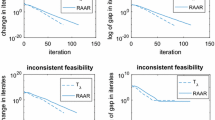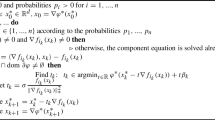Abstract
The randomized version of the Kaczmarz method for the solution of consistent linear systems is known to converge linearly in expectation. And even in the possibly inconsistent case, when only noisy data is given, the iterates are expected to reach an error threshold in the order of the noise-level with the same rate as in the noiseless case. In this work we show that the same also holds for the iterates of the recently proposed randomized sparse Kaczmarz method for recovery of sparse solutions. Furthermore we consider the more general setting of convex feasibility problems and their solution by the method of randomized Bregman projections. This is motivated by the observation that, similarly to the Kaczmarz method, the Sparse Kaczmarz method can also be interpreted as an iterative Bregman projection method to solve a convex feasibility problem. We obtain expected sublinear rates for Bregman projections with respect to a general strongly convex function. Moreover, even linear rates are expected for Bregman projections with respect to smooth or piecewise linear-quadratic functions, and also the regularized nuclear norm, which is used in the area of low rank matrix problems.






Similar content being viewed by others
Notes
Because very general control sequences besides simple cyclic control fulfill this requirement, the corresponding method was also called method of random Bregman projections in [4]. But such control sequences are not necessarily stochastic objects, in contrast to the situation in the present work. Hence we use the word randomized in Algorithm 3 instead of random to distinguish between the cases.
References
Agaskar, A., Wang, C., Lu, Y.M.: Randomized Kaczmarz algorithms: exact MSE analysis and optimal sampling probabilities. In: IEEE global conference on signal and information processing (GlobalSIP) (2015)
Alber, Y., Butnariu, D.: Convergence of Bregman projection methods for solving consistent convex feasibility problems in reflexive Banach spaces. J. Optim. Theory Appl. 92(1), 33–61 (1997)
Bauschke, H.H., Borwein, J.M.: On projection algorithms for solving convex feasibility problems. SIAM Rev. 38(3), 367–426 (1996)
Bauschke, H.H., Borwein, J.M.: Legendre functions and the method of random Bregman projections. J. Convex Anal. 4(1), 27–67 (1997)
Bauschke, H.H., Borwein, J.M., Combettes, P.L.: Bregman monotone optimization algorithms. SIAM J. Control Optim. 42(2), 596–636 (2003)
Bauschke, H.H., Borwein, J.M., Li, W.: Strong conical hull intersection property, bounded linear regularity, Jameson’s property (G), and error bounds in convex optimization. Math. Program. 86(1), 135–160 (1999)
Brand, M.: Fast low-rank modifications of the thin singular value decomposition. Linear Algebra Appl. 415(1), 20–30 (2006)
Bregman, L.M.: The relaxation method for finding common points of convex sets and its application to the solution of problems in convex programming. USSR Comput. Math. Math. Phys. 7, 200–217 (1967)
Briskman, J., Needell, D.: Block Kaczmarz method with inequalities. J. Math. Imaging Vis. 52(3), 385–396 (2015)
Burger, M.: Bregman distances in inverse problems and partial differential equations. In: Hiriart-Urruty, J.-B., Korytowski, A., Maurer, H., Szymkat, M. (eds.) Advances in Mathematical Modeling, Optimization and Optimal Control, pp. 3–33. Springer (2016)
Byrne, C.: Iterative oblique projection onto convex sets and the split feasibility problem. Inverse Probl. 18, 441–453 (2002)
Byrne, C.: A unified treatment of some iterative algorithms in signal processing and image reconstruction. Inverse Probl. 20, 103–120 (2004)
Byrne, C., Censor, Y.: Proximity function minimization using multiple Bregman projections, with applications to split feasibility and Kullback–Leibler distance minimization. Ann. Oper. Res. 105, 77–98 (2001)
Cai, J.-F., Candès, E.J., Shen, Z.: A singular value thresholding algorithm for matrix completion. SIAM J. Optim. 20(4), 1956–1982 (2010)
Cai, J.-F., Osher, S., Shen, Z.: Convergence of the linearized Bregman iteration for \(\ell _1\)-norm minimization. Math. Comput. 78, 2127–2136 (2009)
Candès, E.J., Tao, T.: Decoding by linear programming. IEEE Trans. Inf. Theory 51(12), 4203–4215 (2005)
Censor, Y., Elfving, T.: A multiprojection algorithm using Bregman projections in a product space. Numer. Alg. 8, 221–239 (1994)
Censor, Y., Elfving, T., Kopf, N., Bortfeld, T.: The multiple-sets split feasibility problem and its applications for inverse problems. Inverse Probl. 21, 2071–2084 (2005)
Chen, S.S., Donoho, D.L., Saunders, M.A.: Atomic decomposition by basis pursuit. SIAM J. Sci. Comput. 20(1), 33–61 (1998)
Chen, X., Powell, A.M.: Almost sure convergence of the Kaczmarz algorithm with random measurements. J. Fourier Anal. Appl. 18(6), 1195–1214 (2012)
Deutsch, F., Hundal, H.: The rate of convergence for the method of alternating projections, II. J. Math. Anal. Appl. 205(2), 381–405 (1997)
Elad, M.: Sparse and redundant representations: from theory to applications in signal and image processing. Springer, New York (2010)
Hansen, P.C., Saxild-Hansen, M.: AIR tools—a MATLAB package of algebraic iterative reconstruction methods. J. Comput. Appl. Math. 236(8), 2167–2178 (2012)
Hoffman, A.J.: On approximate solutions of systems of linear inequalities. J. Res. Natl. Bur. Stand. 49(4), 263–265 (1952)
Kaczmarz, S.: Angenäherte Auflösung von Systemen linearer Gleichungen. Bulletin International de l’Academie Polonaise des Sciences et des Lettres 35, 355–357 (1937)
Lai, M.J., Yin, W.: Augmented \(\ell _1\) and nuclear-norm models with a globally linearly convergent algorithm. SIAM J. Imaging Sci. 6(2), 1059–1091 (2013)
Leventhal, D., Lewis, A.S.: Randomized methods for linear constraints: convergence rates and conditioning. Math. Oper. Res. 35(3), 641–654 (2010)
Lorenz, D.A., Schöpfer, F., Wenger, S.: The linearized Bregman method via split feasibility problems: analysis and generalizations. SIAM J. Imaging Sci. 7(2), 1237–1262 (2014)
Lorenz, D.A., Wenger, S., Schöpfer, F., Magnor, M.: A sparse Kaczmarz solver and a linearized Bregman method for online compressed sensing. In: 2014 IEEE International Conference on Image Processing (ICIP), pp. 1347–1351. IEEE (2014)
Mansour, H., Yilmaz, O.: A fast randomized Kaczmarz algorithm for sparse solutions of consistent linear systems. arXiv preprint arXiv:1305.3803 (2013)
Needell, D.: Randomized Kaczmarz solver for noisy linear systems. BIT Numer. Math. 50(2), 395–403 (2010)
Needell, D., Srebro, N., Ward, R.: Stochastic gradient descent, weighted sampling, and the randomized Kaczmarz algorithm. Math. Program. 155(1), 549–573 (2016)
Needell, D., Tropp, J.A.: Paved with good intentions: analysis of a randomized block Kaczmarz method. Linear Algebra Appl. 441, 199–221 (2014)
Nesterov, Y.: Efficiency of coordinate descent methods on huge-scale optimization problems. SIAM J. Optim. 22(2), 341–362 (2012)
Petra, S.: Randomized sparse block Kaczmarz as randomized dual block-coordinate descent. Analele Stiintifice Ale Universitatii Ovidius Constanta-Seria Matematica 23(3), 129–149 (2015)
Recht, B., Fazel, M., Parrilo, P.A.: Guaranteed minimum-rank solutions of linear matrix equations via nuclear norm minimization. SIAM Rev. 52(3), 471–501 (2010)
Richtárik, P., Takáč, M.: Iteration complexity of randomized block-coordinate descent methods for minimizing a composite function. Math. Program. 144(1–2), 1–38 (2014)
Robinson, S.M.: Some continuity properties of polyhedral multifunctions. Math. Program. Study 14, 206–214 (1981)
Rockafellar, R.T., Wets, R.J.-B.: Variational analysis. Springer, Berlin (2009)
Schöpfer, F.: Exact regularization of polyhedral norms. SIAM J. Optim. 22(4), 1206–1223 (2012)
Schöpfer, F.: Linear convergence of descent methods for the unconstrained minimization of restricted strongly convex functions. SIAM J. Optim. 26(3), 1883–1911 (2016)
Schöpfer, F., Schuster, T., Louis, A.K.: An iterative regularization method for the solution of the split feasibility problem in Banach spaces. Inverse Probl. 24(5), 055008 (2008)
Strohmer, T., Vershynin, R.: A randomized Kaczmarz algorithm with exponential convergence. J. Fourier Anal. Appl. 15(2), 262–278 (2009)
Wang, M., Bertsekas, D.P.: Stochastic first-order methods with random constraint projection. SIAM J. Optim. 26(1), 681–717 (2016)
Yin, W.: Analysis and generalizations of the linearized Bregman method. SIAM J. Imaging Sci. 3(4), 856–877 (2010)
Zhang, H., Hui Cai, J.F., Cheng, L., Zhu, J.: Strongly convex programming for exact matrix completion and robust principal component analysis. Inverse Probl. Imaging 6(2), 357–372 (2012)
Zhang, H., Cheng, L.: Restricted strong convexity and its applications to convergence analysis of gradient-type methods in convex optimization. Optim. Lett. 9(5), 961–979 (2015)
Zhao, J., Yang, Q.: Several solution methods for the split feasibility problem. Inverse Probl. 21, 1791–1799 (2005)
Zouzias, A., Freris, N.M.: Randomized extended Kaczmarz for solving least squares. SIAM J. Matrix Anal. Appl. 34(2), 773–793 (2013)
Author information
Authors and Affiliations
Corresponding author
Additional information
The work of D.L. was partially supported by the National Science Foundation under Grant DMS-1127914 to the Statistical and Applied Mathematical Sciences Institute. Any opinions, findings, and conclusions or recommendations expressed in this material are those of the author(s) and do not necessarily reflect the views of the National Science Foundation.
Electronic supplementary material
Below is the link to the electronic supplementary material.
Rights and permissions
About this article
Cite this article
Schöpfer, F., Lorenz, D.A. Linear convergence of the randomized sparse Kaczmarz method. Math. Program. 173, 509–536 (2019). https://doi.org/10.1007/s10107-017-1229-1
Received:
Accepted:
Published:
Issue Date:
DOI: https://doi.org/10.1007/s10107-017-1229-1
Keywords
- Randomized Kaczmarz method
- Linear convergence
- Bregman projections
- Sparse solutions
- Split feasibility problem
- Error bounds




